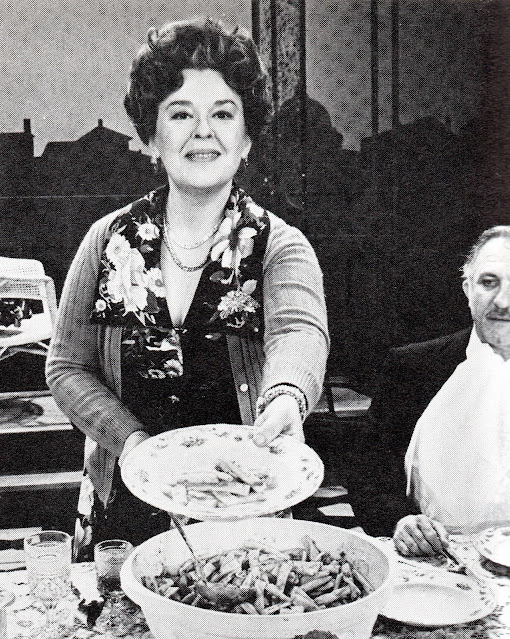 |
| William McCauley, Susan Merson, Eli Wallach. |
 |
| Sam Gray, Jeff Giannone, Walter Abel. |
A mildly diverting comedy that came to Broadway after a
successful staging at Britain’s National Theatre, with the director-designer of
that production, the world famous Franco Zeffirelli, repeating his chores with
an American cast. The first play to reach Broadway by prolific Italian
dramatist-screenwriter-director-actor Eduardo de Filippo, it contained elements
of Neapolitan farce, commedia del’arte, and the subject of a cuckolded husband,
all of which are bound up in many of the writer’s works.
 |
| Sada Thompson, Sam Gray. |
Zeffirelli created extremely realistic scenery for this
large-cast, three-act, family comedy, which takes place in the kitchen and
dining room of a well-to-do Neapolitan family. It begins on Saturday night,
with the actual onstage preparation of a ragu by the matriarch, Rosa (Sada
Thompson), the fragrant aroma of which pervaded the auditorium. It then shows the consumption of that concoction at a Sunday dinner peopled by numerous
friends and relatives. Finally, on Monday morning, the cold leftovers are
finished off.
The central action, apart from the cooking and eating,
concerns a marital misunderstanding between Rosa and her spouse, Peppino (Eli
Wallach). Rosa has been cool to Peppino ever since she began thinking he
slighted her cooking. He, unaware of his contretemps, assumes she has been
having an affair with a good-looking accountant neighbor (Ron Holgate). The
problem is ironed out in the third act after a monumental verbal brawl between
the couple. In the course of the play, the many charming characters surrounding
the married couple are introduced, along with their subplot relationships.
 |
| Eli Wallach, Ron Holgate, Terry Hinz. |
Wallach and Thompson gave their professional best to this
modestly pleasing enterprise in the roles that would be played on film in 1978
by Joan Plowright and Frank Finlay (Laurence Olivier played the elderly Antonio
[Walter Abel on Broadway]). The critics were tolerant of the comedy’s
blandishments, but were not lavish in dispensing accolades. They questioned the
uneven use of Italian dialects, the too-long, two-and-a-half hour length, and the
stock characters and plot. Most agreed with Clive Barnes that it was “a
perfectly agreeable boulevard comedy,” but not much more.
Though all had their reservations, only a few, like Martin
Gottfried and John Simon, were truly ill-disposed toward the play and
production, which lasted a mere week and a half.